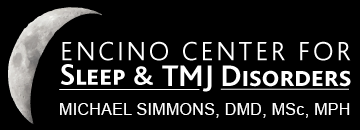What Causes Sleep Apnea Headaches?
If you have sleep apnea, morning headaches are no stranger to you. If you aren’t aware of the connection between sleep apnea and chronic headaches, you may have thought you’ve been suffering from migraines. This misunderstanding often causes people to simply think “there’s nothing to be done,” and take some pain medication and suffer through the day.
At Encino Center for Sleep Apnea & TMJ Disorders, we’re dedicated to the comfort and health of our patients. If you’re a sleep apnea patient who experiences chronic headaches, or you suspect you may have sleep apnea, please visit our page about sleep apnea diagnosis.
What Is a Sleep Apnea Headache?
Sleep apnea is a condition that causes breathing to stop during sleep. This causes your body and your blood to become deprived of oxygen throughout the night. When blood becomes deoxygenated, it traps in carbon dioxide, causing blood vessels to grow. This growth results in pressure being put on the brain and thus, giving you a headache.
Apnea Headaches vs Migraines
To those unfamiliar with sleep apnea, a headache caused by the condition can easily be mistaken for chronic migraines. But there are some differences that can help you to know which one you’re experiencing:
- Studies suggest sleep apnea headaches occur on both sides of the head
- Migraines can last hours or days, while sleep apnea headaches only last about 30 minutes
- Migraines often come with nausea and sensitivity to light
- Sleep apnea headaches occur more frequently
Regardless of which kind of headache you experience, it may be wise to discuss your symptoms with your primary care physician.
Helpful Tips and Treatments
CPAP Therapy
The most common treatment for sleep apnea is the use of a CPAP (continuous positive airway pressure) machine. CPAP is a therapy that uses air pressure to force the body to continue breathing during sleep.
CPAP is the most effective treatment for sleep apnea. Along with preventing your headaches at the source, CPAP therapy can also:
- Lower high blood pressure
- Reduce the risk of stroke
- Reduce lapses in breathing
Oral Appliance Therapy
Oral Appliance Therapy, or OAT, is a treatment choice for many sleep disorders. It’s often recommended for simple snoring, mild to severe sleep apnea, and for CPAP intolerant patients.
These appliances typically work by advancing the jaw and keeping the tongue from blocking the airway, and by tightening the throat muscles, causing the throat to be more open so you can breathe better. These devices may appear similar to athletic mouthpieces and orthodontic retainers, but they’re significantly different. Oral appliances are generally quite effective and are well tolerated by most patients.
Changes to Lifestyle
If you aren’t ready to apply a CPAP machine or an oral appliance to your sleep, there are lifestyle changes that can be made to reduce sleep apnea.
- Avoid alcohol before bedtime– Alcohol and other sedatives relax your muscles, making it more likely for you to experience an obstruction in your airway.
- Weight loss — If you’re overweight, your doctor may recommend weight loss as an option for alleviating sleep apnea. This is because fatty deposits can often reside in the neck and tongue which add to blockages in the airway.
- Change your sleeping position — sleeping on your back can exacerbate sleep apnea issues. Try sleeping on your side or stomach to free up your airway at night.
Find the Relief You Need at Encino Center for Sleep and TMJ Disorders
At Encino Center for Sleep and TMJ Disorders, we want to make sure you’re getting the best care for your sleep apnea. If you think you may have sleep apnea, please talk to your primary care physician, or contact us at (818) 300-0070. You can also fill out an online contact form and we’ll get back to you shortly.
